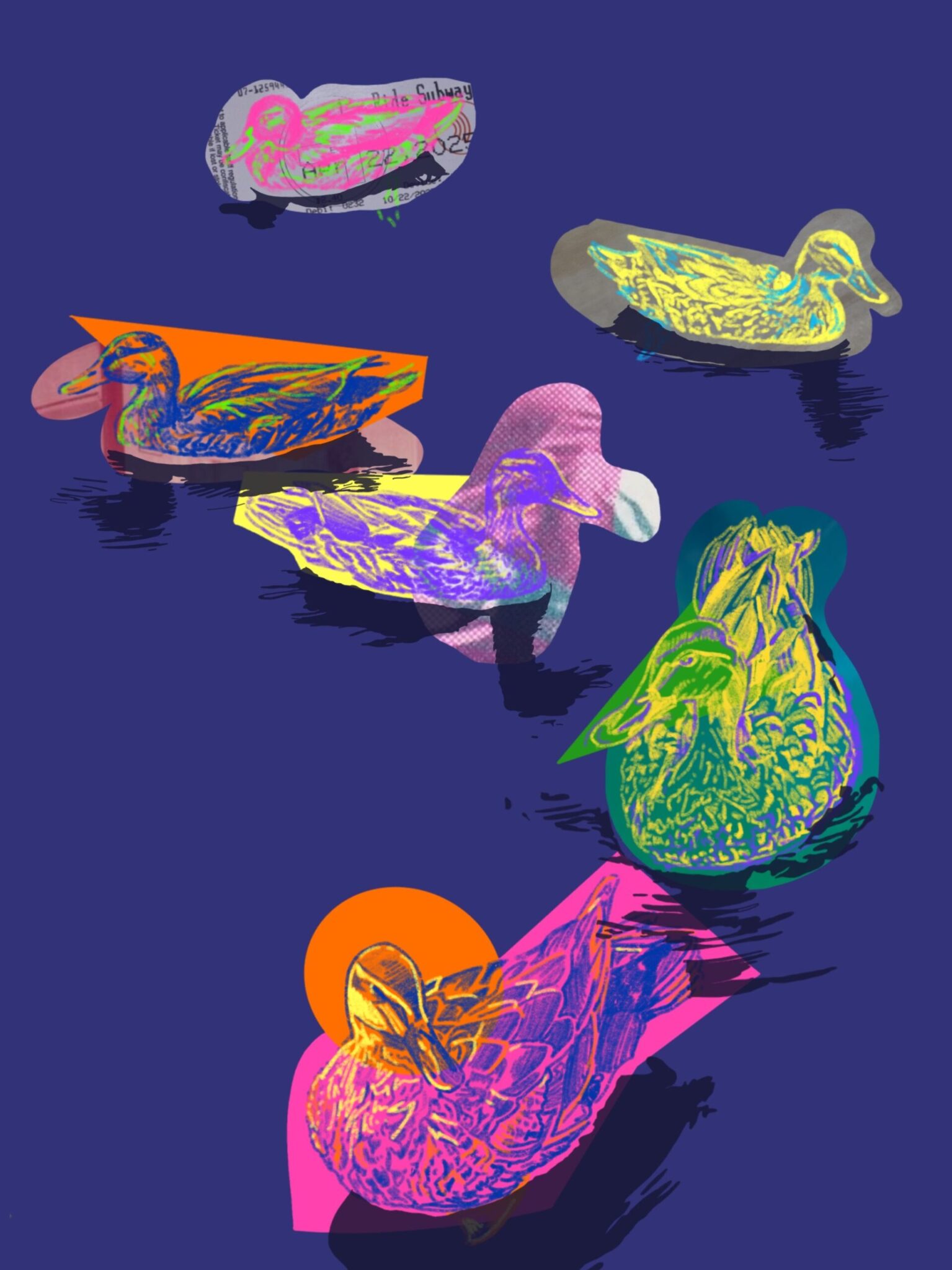
Illustration by Davianna Inirio
YDN Magazine Co-Editor-in-Chief and amateur bird appreciator Audrey Kolker ʼ25 talks to banjoist and bird owner Lyle Griggs ʼ25 about ducks.
AK: Hi.
LG: Hi.
AK: This is Lyle. Lyle has ducks.
LG: I do.
AK: Discuss them.
LG: Okay.
AK: What are their names?
LG: Their names are Betty and Ophelia. These ducks reside in the backyard of TUIB house, or Tangled Up in Blue, Yale’s premier American folk music group. And because of that they’re named after characters in songs that we sing. Originally it was Betty and Dupree, but Dupree was killed by a red tailed hawk. Last November, I believe.
AK: Oh dear.
LG: They’re Muscovy ducks. Which is convenient, because that’s the one domestic variety of duck that doesn’t quack. The neighbors haven’t complained. As for why we have them, which tends to be the more pressing question—I grew up breeding poultry. So my family shows chickens and ducks, primarily chickens. So I’m very accustomed to having animals around.
AK: Can you describe the death of Dupree?
LG: Well, the death of Dupree was an interesting moment for me because it reminded me of how accustomed I became during my childhood to animal death. Because I went out and I saw—I didn’t see the hawk hit, but I saw Dupree lying there dead. And I saw a hawk, you know, perched on the edge of their enclosure. My reaction to that situation is pretty muted. My housemates did not have muted reactions to the death of the duck. Which made me feel—so they asked, for example, if I was going to bury it, at which point I had already… disposed of Dupree, in the typical sort of ceremonious way.
AK: In the trash?
LG: In the trash, yeah. But it was a very sad day for everybody.
AK: How did Betty behave?
LG: That was the saddest part. Betty was young. And they had been only with each other for most of their lives. And ducks are very gregarious, and they really pair bond. So Betty stayed by the corpse and sort of kept vigil. And that was pretty sad to watch. And that’s why it was urgent, it was important that I get Ophelia as soon as possible. Because after an event like that they can’t be alone.
AK: How soon after the death of Dupree was Ophelia purchased?
LG: I think Dupree died on a Tuesday and I purchased Ophelia on Thursday. It was a good excuse to go to Western Massachusetts.
AK: Are there character differences between Ophelia and Betty?
LG: Those dynamics are evolving because when I got Ophelia, Betty was still pretty young. So they sort of had like a younger-brother-older-sister relationship. She was sort of taking care of him. But now he’s enormous. So, I don’t know…. I mean, they’re inseparable.
AK: Well, they’re in a cage.
LG: They are in a cage. But I mean, like, they’re always within like, an inch of each other.
AK: What have you learned, other than…hawks? In this experience of duck-having in New Haven?
LG: I’ve learned that Muscovys are good at flying. One day, I got a call from one of my housemates. And she said, you know, Ophelia has flown away. She was wandering around on Howe Street. The problem was that she didn’t have any interest in being recaptured. But she also didn’t have any interest in leaving. She just flew out, I think, because she was bored.
AK: What’s in store for them?
LG: What’s in store for them? So that begs a couple of questions. First of all, what am I doing with them over the summer? Answer is, I don’t know. But it definitely complicates leaving New Haven because I can’t just leave them behind.
AK: It’s like having a baby.
LG: It is sort of like having a baby. It’s fortunately a little easier than…
AK: You can’t take it on a plane.
LG: Well, probably not.
AK: Do you have words of wisdom for people who would seek to raise ducks?
LG: They can be eaten by hawks. That’s the most important logistical note. As your drunkenness increases, their friendliness does not. As much as you want that to happen. Um, let’s see…they eat a lot.
AK: What do they eat?
LG: Chicken feed.
AK: Where do you get chicken feed?
LG: Tractor Supply.
AK: Where is Tractor Supply?
LG: The one I go to is on Boston Post Road, but Boston Post Road is the closest thing that you can get to hell on earth. I do genuinely think that Boston Post Road—if you keep driving, I haven’t been that far west, but if you drive on Boston Post Road far enough, you will reach hell. There are things that make Connecticut wonderful and there are things that make Connecticut awful. And Boston Post Road is what makes Connecticut awful. It’s like if you were to design an urban space to make people who occupy it want to throw themselves off of the I-95 Quinnipiac River Bridge, this would be the place. Especially on a cold rainy February day.
AK: Mm. When you’re some poor soul buying straw.







